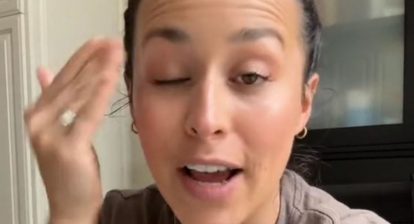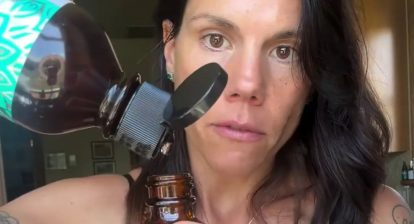In the beauty world, there’s always an oil of the moment. Think back to the era of when coconut oil was in everything or the time everyone went wild for olive oil, thanks to Jennifer Lopez. Plenty of brands have been built on argan oil, plus there’s jojoba, avocado, grapeseed and macadamia nut, to name a few more oils that have grabbed attention. For a while, rosemary oil was center stage for its popularity for hair growth, but it has recently been usurped by castor oil.
Castor oil is the latest beauty oil that is surging—and for good reason. “Castor oil is an excellent hydrator for hair, skin and nails,” says Dallas dermatologist Rebecca Marcus, MD. “Functioning as a humectant, castor oil penetrates the skin and draws moisture in with it. It is rich in ricinoleic acid, which is antibacterial and anti-inflammatory, and these effects may translate to the skin, although this has not been well documented in scientific literature. It has a low comedogenic rating, which means that it will not clog pores. Anecdotally, castor oil has been reported to increase hair growth, and although this may be true, unfortunately, there are no scientific studies that support these claims.”
Read on to find out the benefits of castor oil and whether it can actually promote hair growth.
Featured experts
- Rebecca Marcus, MD is a dermatologist based in Dallas
- Marisa Garshick, MD is a dermatologist based in New York
- Megan Curtin is Briogeo’s director of product marketing and education
What is castor oil?
“Castor oil is an oil derived from castor beans, which come from the Ricinus communis plant,” explains New York dermatologist Marisa Garshick, MD. “It is rich in protein, antioxidants, nutrients and fatty acids and as a result can be helpful for the skin, scalp and hair.”
The vegetable oil is used in a variety of beauty and wellness products, both topically and internally. Dr. Marcus adds that the translucent yellow-tinted oil is also rich in stearic acid, linoleum acid and oleic acid.
Is castor oil good for hair growth?
“There is no conclusive evidence that castor oil can promote hair regrowth. However, anecdotally, people have noticed improvement,” Dr. Garshick says. “It may have other benefits for the hair and scalp, as it helps to strengthen the hair and nourish the scalp, promoting a healthy environment for hair regrowth. Castor oil contains ricinoleic acid, a type of fatty acid, which may boost circulation in the scalp and subsequently promote healthier and stronger hair.”
Additionally, castor oil has anti-microbial and antifungal properties, so it may be helpful to improve overall scalp health while also offering hydration. Castor oil can also work to nourish the hair, leaving it feeling and looking stronger and healthier. “Because it is so moisturizing, it can help increase elasticity and moisture content in hair, which could lead to decreased breakage,” says Briogeo’s Director of Product Marketing and Education Megan Curtin.
Can I apply castor oil directly on my hair?
“Proper use may depend on the specific product that it is formulated in,” Dr. Garshick says. “That said, if applying castor oil directly, it can be applied to damp hair at the roots and combed through towards the ends to ensure even distribution.”
Plain castor oil can also be applied directly to nails and skin. As a soothing treatment for dry skin, Dr. Marcus says castor oil can be used daily. “With any oil treatment, start with a small amount and add more as needed,” Curtin says. “Oiling the hair and scalp is best done weekly as a pre-wash treatment before shampooing.”
When shopping for castor oil for hair, Curtin advises looking for cold-pressed oils in general because they tend to be more nutrient-dense. “Briogeo’s Curl Charisma Organic + Cold-Pressed 100% Castor Oil ($26) is not only a robust source of fatty acids and vitamin E, it’s also certified fair-trade and Fair for Life,” she says.

What are the side effects of castor oil on hair?
Some people can find castor oil to be heavy for fine or thin hair and may prefer a more lightweight oil that doesn’t weigh down their strands, Curtin cautions. “Castor oil is quite thick, so it may be helpful to mix it with a moisturizer or another, thinner oil to make it easier to apply to the hair or skin,” Dr. Marcus says.
Sensitive skin types may want to steer clear of castor oil for hair entirely. “Those who have any scalp conditions including seborrheic dermatitis or a skin sensitivity should be cautious as castor oil may worsen or irritate the area,” Dr. Garshick says. “There have been some allergic reactions to castor oil noted, which may lead to a chance of getting allergic dermatitis. Overuse and improper hair washing of castor oil may also lead to buildup, which may also contribute to irritation and breakouts.”
How long does it take for castor oil to grow hair?
Again, there’s no scientific evidence that supports castor oil as a treatment for hair growth. But, when using it for hair growth, according to Dr. Garshick, it is best to use for at least three to six months to see results with continued improvement with ongoing use.
“It is always important to see a board-certified dermatologist to evaluate the cause of hair loss and discuss additional treatment options,” Dr. Garshick says. “Because hair loss can be multifactorial, it is important to understand what the specific cause of the hair loss is to best treat and manage it. In some cases, certain nutrients or vitamins can be helpful to promote hair regrowth such as iron and vitamin D. Certain shampoos have been found to be helpful in promoting hair growth in certain types of hair loss, such as an anti-fungal shampoo known as ketoconazole. While biotin is often used for hair growth, it is important to note there is not a lot of evidence to support its use for hair growth.”
Additionally, some supplements can help to support hair growth, and certain ingredients—including minoxidil, finasteride or spironolactone—can help prevent further hair loss. Dr. Garshick recommends preventing further loss by minimizing trauma to the hair and avoiding tight hairstyles, which can put tension on hair, plus limiting exposure to hot tools and harsh chemicals.
“If you’re looking for topical products to help with thinning, excess shedding or hair loss, look for products that contain ingredients with scientifically backed evidence of performance,” Curtin says. “Using oils in your routine is a great way to boost hair and scalp health, and castor oil is a great carrier for other beneficial oils.”





